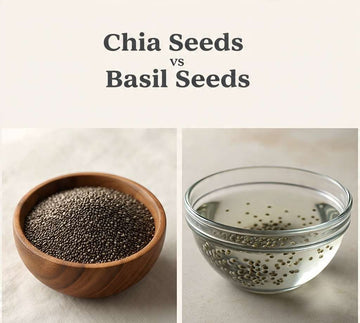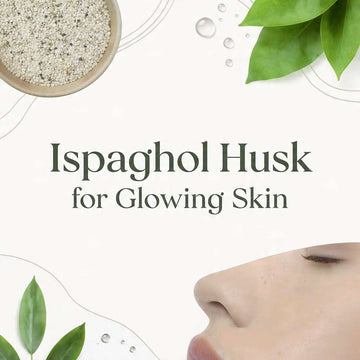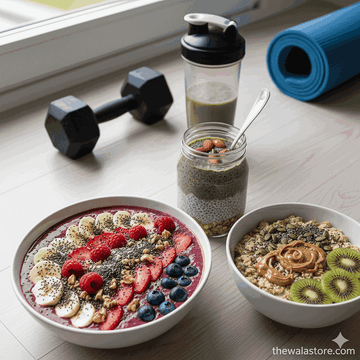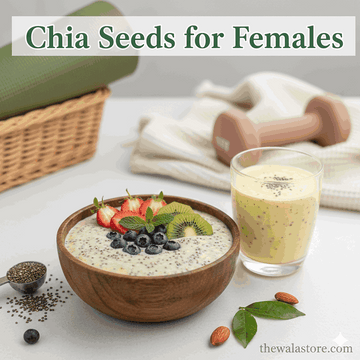Most people in Pakistan think chia seeds and basil seeds are just two names for the same thing, but that’s not true at all. They look kinda similar once soaked, but their background and nutrition are different. Chia comes from Mexico and is now popular worldwide as a superfood, while basil seeds known here as tukhm malanga are an old favorite in desi drinks like Rooh Afza and falooda. So when we talk about chia seeds vs basil seeds, it’s really about two different ingredients that offer their own unique benefits. Knowing the difference helps you use the right one at the right time.
What is Tukh Malanga (Basil Seeds)?
Tukh malanga, or basil seeds, is something almost every Pakistani has seen floating in a glass of Rooh Afza or falooda on a hot summer day. They’re tiny black seeds that puff up and turn jelly-like when soaked in water. People have been using them for ages here, mostly to cool the body and help with digestion. Unlike chia, which is kind of new for us, tukh malanga has always been part of our local drinks and desi traditions.
Origin & History in South Asia
Basil seeds come from the sweet basil plant. They’ve been used across South Asia for hundreds of years, mainly as a natural cooler in hot climates. While chia got famous as a “superfood,” tukhm malanga was already popular in our homes long before that hype.
Common Names
Depending on where you live, you’ll hear different names: tukhmaria, sabja seeds, or just plain basil seeds. All of them mean the same thing, and in Pakistan, “tukh malanga” is the name most people use.
Traditional Uses in Pakistan
The most common use? Drinks. In Ramadan, people love adding them to Rooh Afza, milk sharbat, or falooda to beat the heat. They’re also taken for acidity or stomach issues. Simple, natural, and cheap that’s why almost every household knows them.
What are Chia Seeds?
Chia seeds might feel new in Pakistan, but they’ve actually been around for centuries. They originally come from Mexico and parts of Latin America, where people used them as a staple food long before the “superfood” tag made them famous. In the last few years, they’ve become popular here too, and you’ll now spot them in health stores, online shops, and even added into trendy recipes.
Nutritional Highlights
The main reason people love chia is the nutrition packed into such tiny seeds. They’re full of fiber, which helps with digestion and keeping you full. They also carry a good amount of omega-3 fatty acids that support heart health, plus some protein for energy. Basically, they’re small but pretty powerful when it comes to daily nutrition.
Uses in the Pakistani Diet
While most folks abroad use chia in puddings or smoothies, in Pakistan people have found their own twists. You’ll see them mixed into milk for a light breakfast, sprinkled over parathas or oats, or blended in fruit shakes. Some even use chia in desi desserts for an extra health kick.
Chia Seeds Price in Pakistan
The price depends on quality and packaging. On average, chia seeds in Pakistan range from around Rs. 1,000 to Rs. 1,600 per kg. They’re more expensive than tukh malanga, but that’s because they’re mostly imported and branded as a premium health food.
Difference Between Chia Seeds and Basil Seeds
Even though they look alike once soaked, chia and basil seeds aren’t the same at all. People often mix them up, especially when searching about chia seeds vs tukhm malanga in Urdu, but the truth is they’ve got different looks, nutrition, and even prices in Pakistan. Here’s a quick side-by-side:
|
Feature |
Chia Seeds |
Basil Seeds (Tukh Malanga) |
|
Appearance |
Small, oval, grey/black with white spots |
Round, jet black, slightly bigger |
|
Taste & Texture |
Mild, almost bland, soft when soaked |
Herbal, stronger flavor, crunchy at first then jelly-like |
|
Nutrients |
Rich in fiber, omega-3, protein, energy boost |
Cooling for stomach, good for digestion, light vitamins |
|
Soaking in Water |
Turns into gel-like coating, smooth texture |
Swells bigger, thicker jelly layer, looks heavier |
|
Origin |
Mexico / Latin America |
South Asia, widely grown in Pakistan & India |
|
Price in Pakistan |
Around Rs. 1,000–1,600 per kg |
Cheaper, around Rs. 400–700 per kg |
When you check the nutritional difference, chia seeds lean more toward long-term energy and omega-3 benefits, while basil seeds are known for their cooling effect in summer and helping with digestion. If you compare soaked chia seeds vs soaked basil seeds, chia makes a smoother gel while tukhm malanga puffs up bigger and feels heavier in drinks like Rooh Afza.
So, both have their own role chia works better for weight loss and nutrition, and basil seeds shine when it comes to refreshing summer drinks or easing acidity.
Health Benefits of Chia Seeds
Chia seeds may be tiny, but they pack a lot inside. They’ve become a favorite in Pakistan for folks who want something light, filling, and healthy. Let’s break down why people add them to their diet.
For Weight Loss
One of the biggest reasons people try chia seeds for weight loss is the fiber. When you soak them, they swell up and make you feel full for longer. That means less snacking and fewer random cravings. It’s not some magic fix, but if you mix chia with breakfast or even water, it does help with portion control.
For Heart Health & Energy Boost
Chia isn’t just about keeping your stomach busy. It’s got a good amount of omega-3 fatty acids that are linked to better heart health. Add in some protein, and you’ve got steady fuel for the day. Many people use chia seeds for energy boost before workouts or even as a mid-day drink when they feel sluggish.
For Digestion Support
Because they’re so rich in fiber, chia seeds help keep your digestion smooth. If you deal with constipation or bloating, soaking a spoonful of chia in water and drinking it can make a difference. It’s simple, natural, and something you can easily add into your routine without too much effort.
Health Benefits of Basil Seeds (Tukh Malanga)
If you grew up in Pakistan, you’ve probably had tukh malanga in a cold glass of Rooh Afza or falooda at some point. These tiny black seeds may not look like much, but once soaked they turn into a jelly that feels super refreshing. Let’s check why people love them so much.
Cooling Effect in Summer / Stomach Cooling
The biggest plus of basil seeds is their cooling effect. On those hot summer afternoons, nothing beats a sharbat with soaked tukhmaria. They calm the stomach and reduce heat in the body, which is why you’ll see them everywhere during Ramadan. Many folks trust basil seeds for stomach cooling when spicy or oily food hits too hard.
Helps Digestion & Acidity
One of the well-known tukmaria seeds health benefits is how they ease digestion. They’ve got soluble fiber that can help with constipation, acidity, and bloating. If your stomach feels heavy after a meal, a drink with basil seeds for digestion can actually give quick relief.
Popular in Pakistani Drinks
Tukh malanga isn’t just about health it’s a part of our food culture. You’ll find it in Rooh Afza, falooda, milk sharbat, and even some homemade desi desserts. Families keep them stocked in Ramadan because they’re cheap, natural, and make drinks way more refreshing. This everyday use is why basil seeds are so well known here compared to chia.
Chia Seeds vs Basil Seeds for Weight Loss
When it comes to weight loss, both chia and basil seeds have their own edge. Chia is heavier on fiber and omega-3, which means it keeps you full for longer and gives you steady energy. That’s why many people use chia in the morning or before workouts it’s slow-burning fuel that stops random hunger.
Basil seeds, or tukh malanga, work a bit differently. They don’t have as much omega-3, but they’re light on the stomach and amazing for cooling the body. If you’re trying to lose weight in summer, a glass of Rooh Afza with soaked basil seeds can cut cravings without making you feel stuffed.
So which one’s better for weight loss? Honestly, it depends. If you want long-term energy and filling meals, chia does the job. If your goal is light digestion and staying refreshed, basil seeds fit better.
Can I use chia instead of tukh malanga? You can, but the taste and texture won’t be the same. Chia is more neutral and jelly-like, while basil seeds have that cooling, heavier swell most people expect in desi drinks.
Best Time to Eat Chia Seeds or Basil Seeds
Timing can actually make a big difference in how you feel after eating these seeds. People often ask about the best time to eat chia seeds or basil seeds, and the answer isn’t one-size-fits-all. It depends on your routine and goals.
Chia Seeds
-
Morning with water – A spoon of soaked chia in warm or plain water keeps you full and helps kickstart digestion.
-
Before workout – Chia works well as a natural energy booster thanks to its fiber and omega-3, so it’s good fuel before hitting the gym or even a walk.
-
At night with milk – Many people like mixing chia into milk before bed; it digests slowly and keeps you satisfied till morning.
Basil Seeds (Tukh Malanga)
-
Summer time – The best season for basil seeds. They cool down the body when the weather’s too hot.
-
Before meals – Having them before eating can help reduce acidity and light digestion issues.
-
Ramadan drinks – Basil seeds are a classic in Rooh Afza, falooda, or sharbat during iftar. They refresh you after a long fast.
So, chia fits better when you need energy and filling meals, while basil seeds shine when you want cooling relief or light digestion support.
How to Identify Chia Seeds vs Basil Seeds (Visual Guide)
If you’ve ever stared at a glass of soaked seeds and wondered “are chia seeds and basil seeds the same?”, don’t worry you’re not alone. They look kinda similar once soaked, but a closer look makes it easy to tell them apart.
Quick Identification Tips
-
Chia Seeds
-
Smaller in size, usually grey or black with tiny white spots.
-
Mild, almost neutral taste.
-
Gel-like coating forms quickly when soaked.
-
Often used in smoothies, puddings, or breakfast oats.
-
Basil Seeds (Tukh Malanga)
-
Slightly bigger, solid black.
-
Stronger, herbal taste.
-
Swells into bigger jelly when soaked, thicker texture.
-
Commonly added to Rooh Afza, falooda, or milk drinks in Pakistan.
Quick Table Comparison
|
Feature |
Chia Seeds |
Basil Seeds |
|
Size |
Small, tiny |
Slightly bigger |
|
Color |
Grey/black with white spots |
Solid black |
|
Taste |
Mild, neutral |
Herbal, strong |
|
Soaking |
Smooth gel |
Bigger, thicker jelly |
|
Common Use |
Puddings, smoothies, oats |
Rooh Afza, falooda, milk drinks |
So, next time you’re not sure, just remember: chia is tiny and mild, basil is bigger and herbal, and both have their own uses. Once you know, mixing them up becomes nearly impossible.
Prices and Availability in Pakistan
If you’re wondering how much these seeds cost in Pakistan, it really depends on what you’re buying and where.
Chia Seeds Price in Pakistan
Chia seeds are mostly imported, so they’re a bit pricier. On average, you’ll see them around Rs. 1,000 to Rs. 1,600 per kg, depending on the brand and packaging. Some premium stores even charge a bit more, but usually it’s the same quality you’d get online.
Basil Seeds Price in Pakistan
Basil seeds, or tukhm malanga, are way cheaper because they’re locally grown and widely available. You can usually get a kilo for Rs. 400–700, which is great if you want them for daily drinks or desserts.
Where to Buy
-
Local markets: Almost every big city has shops selling both seeds, especially in grocery or health stores.
-
Online stores: You can grab them easily online. Stores like The Wala Store offer pure chia and basil seeds delivered to your doorstep.
Honestly, if you’re starting out, buying online is super convenient because you know exactly what quality you’re getting, and it saves time wandering local markets.
FAQ
Are chia seeds and basil seeds the same?
Nope, they’re not the same. Chia comes from Mexico and is mainly used for fiber and omega-3, while basil seeds, or tukhm malanga, are local to South Asia and are popular in drinks for cooling and digestion. They might look similar once soaked, but their taste, texture, and nutrients are quite different.
Chia seeds vs basil seeds calories?
Chia seeds have a bit more calories than basil seeds because they’re richer in protein and fats. Basil seeds are lighter and mostly water and fiber when soaked, so they’re great if you want something low-cal but filling.
Taste difference between chia and basil seeds?
Chia is pretty bland and mild, almost neutral in taste. Basil seeds have a slightly herbal, stronger flavor, which is why they’re perfect in Rooh Afza or falooda.
Can kids eat chia or basil seeds?
Yes, both are safe for kids, but always in small amounts. Soak them first to avoid choking and mix into milk, smoothies, or desserts for easier eating.
Chia seeds vs tukmaria – which is better?
Honestly, it depends on your goal. For weight loss, energy, and omega-3 benefits, chia is better. For cooling, light digestion, or summer drinks, tukhmaria (basil seeds) wins. Both are healthy, so why not use both in different situations?
Conclusion
So, to wrap it up, both chia seeds and basil seeds are super healthy, but they’re really different in what they offer. Chia gives you a solid nutrition boost with fiber, omega-3, and protein, while basil seeds (tukh malanga) are awesome for cooling your body and helping digestion. Honestly, it’s not about picking one over the other it’s about what you need at the moment. Want energy and fullness? Go for chia. Looking to refresh on a hot summer day or ease your stomach? Basil seeds are your friend. Either way, knowing the difference makes it easier to use them right.






